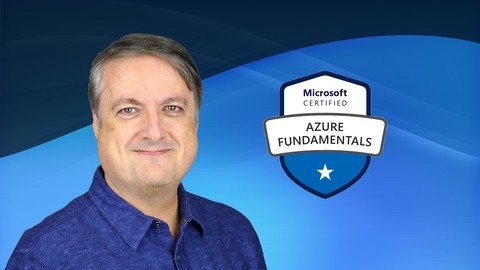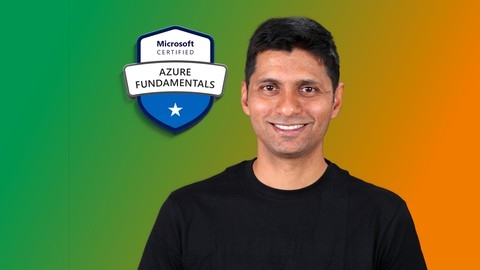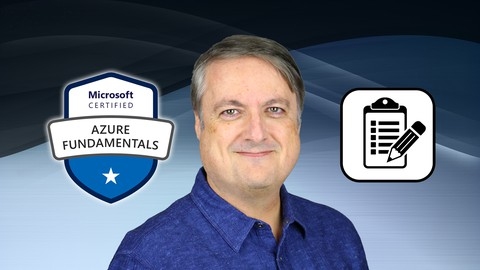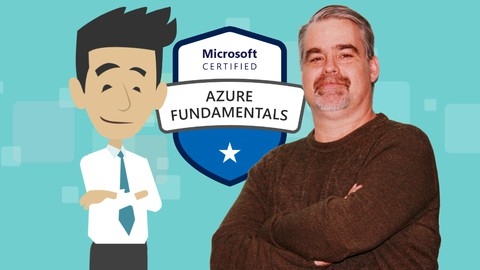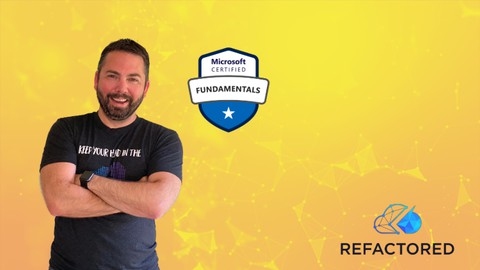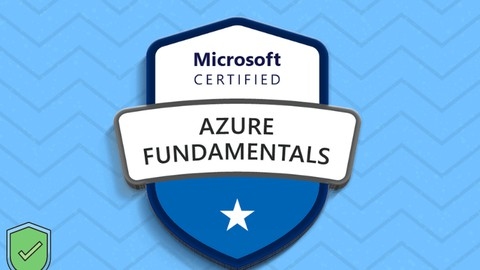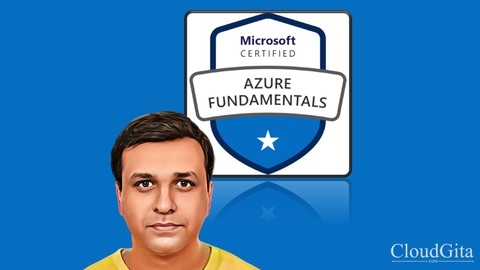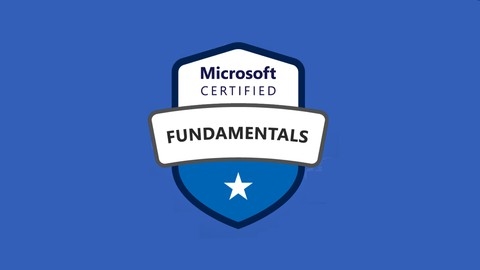Microsoft Azure is a cloud computing platform that offers a wide range of services, from compute and storage to networking and security.
Learning about Azure can help you build, deploy, and manage applications in the cloud, opening doors to exciting career opportunities in cloud computing.
Whether you’re a beginner or an experienced IT professional, understanding the fundamentals of Azure is essential for success in today’s cloud-centric world.
Finding the right Azure Fundamentals (AZ-900) course on Udemy can be a challenge, with so many options available.
You want a course that’s comprehensive, engaging, and taught by experts, but also fits your learning style and goals.
For the best AZ-900 course overall on Udemy, we recommend “AZ-900: Microsoft Azure Fundamentals Exam Prep - JAN 2024” by Scott Duffy.
This course stands out for its comprehensive coverage of the AZ-900 exam objectives, including cloud concepts, Azure services, security, pricing, and support.
The instructor, Scott Duffy, is an experienced Azure professional who delivers clear explanations and engaging demonstrations.
The course also includes practice exams and a study guide to help you prepare for the certification exam.
While this is our top pick, there are other great options available on Udemy.
Keep reading for more recommendations for different learning styles and goals, including courses focused on specific Azure services, hands-on labs, and real-world projects.
AZ-900: Microsoft Azure Fundamentals Exam Prep - JAN 2024
Led by instructor Scott Duffy, this regularly updated course covers a wide range of topics essential for both non-technical and technical professionals.
You’ll start by diving into the fundamentals of cloud computing, exploring its benefits, such as high availability, scalability, elasticity, reliability, and enhanced security.
The course then delves into the different types of cloud services, including public, private, and hybrid cloud models, helping you understand the distinctions and choose the right fit for your needs.
One of the course’s strengths is its comprehensive coverage of Azure’s core architectural components.
You’ll learn about regions, availability zones, resource groups, subscriptions, and management groups, giving you a solid grasp of Azure’s infrastructure and how to organize and manage your resources effectively.
The course also provides an in-depth look at Azure’s compute and networking services.
You’ll explore virtual machines (VMs), VM scale sets for scaling compute resources, app services, containers, Azure Virtual Desktop, and Azure Functions.
Additionally, you’ll learn about Azure’s networking services, including VPN gateways, DNS, and public and private endpoints, ensuring you understand how to securely connect and manage your Azure resources.
Storage is another crucial aspect covered in the course.
You’ll learn about Azure’s storage offerings, such as Blob storage, Azure Files, and Azure File Sync.
The instructor even demonstrates how to create and manage storage accounts, upload files, and use tools like Azure Storage Explorer and AzCopy.
Security and identity management are critical components of any cloud solution, and this course doesn’t disappoint.
You’ll dive into Azure Active Directory (Azure AD), authentication and authorization concepts, conditional access, multi-factor authentication (MFA), passwordless authentication, and role-based access control (RBAC).
The course also covers the zero-trust security model and Microsoft Defender for Cloud, ensuring you understand how to secure your Azure resources.
Cost management is another essential topic covered in the course.
You’ll learn about factors that affect costs, how to use the Azure Pricing Calculator and Total Cost of Ownership Calculator, and explore Azure Cost Management and resource tagging strategies.
The course also covers governance and compliance features, such as Azure Blueprints, Azure Policy, resource locks, and Microsoft Purview, helping you ensure your Azure resources adhere to organizational policies and industry regulations.
To reinforce your learning, the course includes numerous live demos, quizzes, and a 50-question practice test, allowing you to apply your knowledge and gauge your exam readiness.
Additionally, you’ll have access to course resources, including a study guide, slides, and audio materials.
Microsoft Azure - Beginner’s Guide + AZ-900
The course starts with an introduction to cloud computing and Azure, guiding you through creating a free Azure account and navigating the portal.
You’ll learn about key terms and concepts essential for understanding Azure’s architecture and services.
One of the course’s strengths is its comprehensive coverage of Azure’s core services, including compute, networking, storage, and databases.
You’ll dive deep into deploying and managing virtual machines (VMs), both Windows and Linux, exploring features like availability sets, zones, and scaling options.
The course also covers Azure Web Apps, Functions, and Kubernetes for containerized applications.
Networking is a crucial aspect of cloud computing, and the course dedicates a section to Azure Virtual Networks, Network Security Groups, VPN connections, and Load Balancing.
You’ll learn how to secure your network and enable communication between resources.
Storage is another critical component, and the course covers Azure Storage Accounts, Blob storage, File shares, and data redundancy options.
You’ll also learn about Azure Data Box and Migrate for data transfer and migration.
Databases are essential for most applications, and the course introduces you to Azure SQL Database, Cosmos DB, and enterprise data warehousing solutions like Azure Synapse Analytics and Data Lake Storage Gen2.
Beyond the core services, the course touches on other important Azure offerings, such as Traffic Manager, Content Delivery Network, DevOps with Azure DevOps, Machine Learning, AI services, and IoT Hub.
Identity and access management are crucial for secure cloud deployments, and the course covers Microsoft Entra ID (formerly Azure Active Directory), Role-Based Access Control (RBAC), Multi-Factor Authentication, and Conditional Access Policies.
The course also delves into Azure management and governance, covering topics like cost management, budgeting, Service Level Agreements (SLAs), Azure Policy, Resource Manager templates, and monitoring with Azure Monitor and Log Analytics.
Throughout the course, you’ll have opportunities to apply your knowledge through hands-on labs, ensuring you gain practical experience with the concepts and services covered.
The syllabus concludes with a practice section, including practice tests to help you prepare for the AZ-900 exam, which validates your foundational knowledge of cloud services and Azure.
AZ-900 Microsoft Azure Fundamentals in a Weekend
The syllabus covers a wide range of topics, starting with an introduction to cloud computing and Azure.
You’ll learn about Azure’s global infrastructure, including regions and availability zones, which are crucial for building highly available and resilient applications.
The course dives deep into virtual machines (VMs), exploring their creation, configuration, and management.
You’ll also learn about scaling VMs using availability sets and virtual machine scale sets.
Moving on, you’ll explore Azure’s managed compute services, such as App Service for hosting web applications, Azure Functions for serverless computing, and Azure Kubernetes Service (AKS) for container orchestration.
The course covers Azure Storage services like Blob Storage, File Storage, and Azure File Sync, which are essential for storing and managing data in the cloud.
Databases are a critical component of most applications, and the course dedicates a section to exploring Azure’s relational and NoSQL database offerings, including Azure SQL Database, Azure Cosmos DB, and Azure Cache for Redis.
You’ll learn about database fundamentals, such as availability, durability, and data consistency, to help you make informed decisions when choosing a database solution.
Networking is another crucial aspect covered in the course.
You’ll learn about Azure Virtual Networks, subnets, network security groups, and Azure Firewall.
The course also covers hybrid cloud scenarios, where you can connect your on-premises infrastructure to Azure using VPNs or ExpressRoute.
Security and identity management are essential topics in the cloud, and the course covers Azure Active Directory (now Microsoft Entra ID) for identity and access management, as well as Azure Key Vault for securely storing and managing secrets.
You’ll also learn about role-based access control (RBAC) and conditional access policies.
The course explores Azure’s governance and compliance features, such as Azure Policy, Azure Blueprints, and Resource Locks, which help you maintain control and ensure compliance with industry standards and regulations.
Cost management is a critical aspect of cloud computing, and the course covers various cost models, including CapEx vs. OpEx, consumption-based pricing, and fixed-price models.
You’ll learn how to estimate costs using the Azure Pricing Calculator and analyze your spending with Azure Cost Management.
Finally, the course touches on DevOps practices in Azure, including continuous integration and continuous deployment (CI/CD) with Azure DevOps, infrastructure as code using ARM templates, and Azure Resource Manager.
AZ-900: Microsoft Azure Fundamentals Original Practice Tests
This course consists of three practice tests: Test A, Test B, and Test C. Each test is designed to help you prepare for the AZ-900 certification exam.
The practice tests cover a wide range of topics related to Microsoft Azure, including core Azure services, security, privacy, compliance, trust, pricing, and support.
By taking these tests, you’ll get a feel for the types of questions you can expect on the actual certification exam.
One of the key advantages of this course is that it provides you with a realistic testing environment.
The tests are timed, just like the real exam, so you can practice managing your time effectively.
Additionally, you’ll receive detailed explanations for each question, helping you understand the reasoning behind the correct answers.
Transitioning to the next point, the course offers a convenient online format, allowing you to access the practice tests from anywhere with an internet connection.
This flexibility makes it easier to fit your study sessions into your busy schedule.
AZ-900 Bootcamp: Microsoft Azure Fundamentals (FEB 2024)
The course starts with an introduction to the instructor and a pre-assessment to gauge your current knowledge level.
It then provides a wealth of complementary tools and learning aids, including a companion workbook, free access to hands-on lab simulations, an exam simulator, flashcards, and even a crossword puzzle to make learning fun.
The core content is divided into several chapters, covering essential Azure concepts and services.
You’ll learn about basic cloud computing concepts, such as the shared responsibility model, cloud models (public, private, and hybrid), and the benefits of cloud computing.
The course then dives into different cloud service types, including Infrastructure-as-a-Service (IaaS), Platform-as-a-Service (PaaS), and Software-as-a-Service (SaaS).
You’ll gain a solid understanding of Azure’s core architectural components, such as regions, availability zones, resource groups, and subscriptions.
The course also covers Azure’s compute services, including virtual machines, VM scale sets, app services, and Azure Functions.
Additionally, you’ll explore serverless computing, containers, and Kubernetes.
Network services are a crucial aspect of Azure, and the course provides in-depth coverage of virtual networks, DNS, VPN gateways, ExpressRoute, and private links.
Storage services, such as Blob storage, Azure Files, and managed disks, are also covered in detail.
The course dedicates a significant portion to identity, access, and security in Azure.
You’ll learn about Azure Active Directory (Entra ID), multi-factor authentication (MFA), role-based access control (RBAC), and the zero-trust methodology.
Additionally, you’ll explore governance, compliance, and cost management strategies in Azure.
Throughout the course, you’ll have opportunities to reinforce your learning through quizzes, hands-on labs, and demos.
The instructor also provides additional resources, such as recommended reading and optional tech talks, to further enhance your understanding.
Azure Fundamentals: AZ-900 Certification +Practice Questions
The course starts with an introduction to cloud computing, explaining the benefits of using cloud services like high availability, scalability, and cost savings.
You’ll learn about the different types of cloud models (public, private, hybrid) and the various cloud service categories (IaaS, PaaS, SaaS).
Next, you’ll dive into the core Azure services and products.
The course covers essential topics like Azure regions, availability zones, resource groups, and the Azure Resource Manager.
You’ll get hands-on experience creating virtual machines, configuring virtual networks, and setting up blob storage.
The instructors also introduce you to powerful tools like the Azure CLI and PowerShell for managing your resources.
One of the strengths of this course is its focus on practical skills.
You’ll work through several hands-on labs to reinforce your learning, such as implementing an IoT hub, creating an Azure Function, and securing network traffic with Azure Firewall.
Security is a critical aspect of any cloud platform, and this course devotes an entire module to Azure security, privacy, compliance, and trust.
You’ll explore Azure Active Directory for identity management, the Azure Security Center for threat protection, and Azure Key Vault for safeguarding secrets.
The instructors also cover important governance tools like Azure Policy and role-based access control (RBAC).
To help you monitor and optimize your Azure environment, the course includes lessons on Azure Monitor, Service Health, and the Azure Advisor.
You’ll learn how to track the performance and health of your resources, respond to alerts, and get actionable recommendations.
In the final module, you’ll tackle the business side of Azure, including subscriptions, cost management, and support options.
The instructors walk you through using the Azure Pricing Calculator and Total Cost of Ownership (TCO) Calculator to estimate and optimize your spending.
You’ll also discover the different Azure support plans and learn how to open a support ticket.
Throughout the course, you’ll have opportunities to test your knowledge with quizzes and a full-length practice exam that simulates the real AZ-900 certification test.
By the end, you’ll have a solid foundation in Azure and be well-prepared to earn your credential.
With a good mix of theory, demonstrations, and hands-on labs, you’ll gain the skills and confidence to navigate the Azure portal, deploy resources, and leverage key services.
AZ-900 - Azure Fundamentals 2024 Exam & Certification Prep
This course takes you on a journey through all the essential topics, starting with an Azure primer to give you a solid foundation.
You’ll get a 10,000-foot overview of Microsoft Azure and a quick demo of the Azure portal to familiarize yourself with the platform.
As you progress through the course, you’ll dive into the core concepts of cloud computing, including cloud service models like public, private, and hybrid clouds, and the shared responsibility model.
You’ll learn about the benefits of cloud services, such as high availability, scalability, elasticity, manageability, security, and governance.
The course covers the core architectural components of Azure, including accounts, subscriptions, resource groups, and regions.
You’ll explore Azure networking, compute services like virtual machines, app services, containers, and serverless computing, and compare the different compute options.
Azure storage is a critical topic, and you’ll get a complete overview of the various storage services, management tools, and migration options.
The course even includes a demo of AZCopy in action to reinforce your knowledge.
Identity and access management are crucial for securing your Azure environment, and the course covers Azure Active Directory (now called Entra ID), conditional access, and role-based access controls (RBAC).
You’ll also learn about other essential Azure services, such as IoT, big data, and machine learning, to give you a well-rounded understanding of the platform.
Finally, the course covers compliance, security, and cost management in Azure.
You’ll learn about the Azure Security Center and get a walkthrough of the pricing calculator and Azure Advisor.
Throughout the course, you’ll find a mix of lectures, demos, and articles to reinforce your learning.
The course slides are provided as a PDF for easy reference.
AZ-900 : Microsoft Azure Fundamentals Practice Tests 2024
The course provides a comprehensive set of six practice tests that simulate the actual timed AZ-900 exam.
Each test gives you 90 minutes to answer all the questions, just like the real exam.
After completing each test, you get a detailed report that highlights your performance.
What’s really helpful is that you can review each question in depth by clicking on “REVIEW QUESTIONS”.
This takes you through a detailed explanation for every single question, complete with relevant images and links to the official Microsoft Azure documentation.
The course creator is also very accessible if you have any doubts or questions.
You can reach out via direct message, the Q&A forum, or even join their Discord group for interactive discussions.
They’ve also provided a handy study notes PDF to supplement your learning.
To get the most out of these practice tests, the course recommends attempting each one until you can comfortably score 90% or higher.
It’s not just about getting the right answers, but really understanding the explanations and exploring the reference links provided.
The well-structured practice tests, detailed explanations, and responsive support make it a strong contender among the best Azure Fundamentals courses available.
AZ-900: Microsoft Azure Fundamentals Video Course - Jan 2024
The course starts by introducing you to the basics of cloud computing and why it’s important in today’s digital landscape.
You’ll learn about the benefits of using cloud services, such as high availability, fault tolerance, and disaster recovery.
The instructors explain key concepts like scalability, elasticity, and agility, which are crucial for understanding how the cloud enables businesses to adapt and grow.
Next, you’ll dive into the core architectural components of Azure, including data centers, regions, availability zones, and resource groups.
The course explains how these components work together to provide a reliable and efficient cloud infrastructure.
You’ll also learn about Azure Resource Manager (ARM), subscriptions, and management groups, which are essential for organizing and managing your Azure resources.
One of the strengths of this course is its hands-on approach.
You’ll have the opportunity to provision a virtual machine, deploy a webpage, and configure load balancing and availability sets.
The instructors provide step-by-step demos that make it easy to follow along and gain practical experience with Azure services.
The course also covers serverless technologies like Azure Functions and Logic Apps, which allow you to build and run applications without worrying about infrastructure management.
You’ll learn how these services can help you develop scalable and cost-effective solutions.
Networking is another key topic covered in this course.
You’ll explore virtual networks, subnets, VPN gateways, and other networking services that enable secure connectivity between your Azure resources and on-premises environments.
The instructors explain concepts like Azure DNS, service endpoints, and private endpoints, which are essential for managing and securing your network traffic.
Storage is a critical component of any cloud solution, and this course provides a comprehensive overview of Azure storage services.
You’ll learn about blob storage, table storage, queue storage, and file share storage, as well as disk storage options for virtual machines.
The instructors demonstrate how to provision a storage account, configure data redundancy options, and use tools like Azure Storage Explorer and AzCopy to manage your data.
Security is a top priority in the cloud, and this course dedicates a significant portion to Azure identity, access, and security services.
You’ll learn about authentication and authorization, Azure Active Directory (AD), role-based access control (RBAC), and multi-factor authentication.
The instructors explain how to create users and groups in Azure AD, configure conditional access policies, and implement zero trust principles to protect your resources.
Cost management is another important aspect of using Azure, and this course provides valuable insights into pricing models, cost factors, and cost reduction methods.
You’ll learn how to use the Azure pricing calculator and total cost of ownership (TCO) calculator to estimate and optimize your cloud expenses.
The instructors also introduce you to Azure Cost Management and Billing, which helps you monitor and control your spending.
Throughout the course, you’ll find quizzes and practice tests that reinforce your learning and prepare you for the AZ-900 exam.
The instructors provide exam tips and alerts to help you focus on the key concepts and avoid common pitfalls.
AZ-900: Microsoft Azure Fundamentals Certification
The course starts by introducing you to the key concepts of cloud computing, including the need for cloud computing, its benefits, and the different cloud models like public, private, and hybrid clouds.
You’ll learn about essential terminology and the economies of scale that make cloud computing so cost-effective.
Next, you’ll dive into the core Azure services and architectural components.
The course covers Azure regions, availability zones, and resource groups, giving you a solid understanding of how Azure organizes its resources.
You’ll explore Azure compute services like virtual machines and containers, learning how to deploy and manage them through hands-on lab activities.
Networking is a crucial aspect of Azure, and this course has you covered.
You’ll learn about virtual networks, load balancers, VPN gateways, and content delivery networks (CDNs).
The lab activities will give you practical experience in setting up and configuring these networking components.
Data is the lifeblood of any application, and Azure offers a wide range of storage and database services.
The course covers structured, semi-structured, and unstructured data, as well as Azure storage accounts and database services like Azure SQL.
You’ll get hands-on experience working with Azure Blob storage and SQL databases.
Security is a top priority in the cloud, and this course dedicates an entire module to Azure security, privacy, compliance, and trust.
You’ll learn about Azure firewalls, DDoS protection, network security groups, and authentication and authorization using Azure Active Directory.
The course also covers security management tools like Azure Security Center and Key Vault.
To help you manage and govern your Azure resources effectively, the course covers topics like Azure Policy, Role-Based Access Control (RBAC), locks, and blueprints.
You’ll learn how to monitor your Azure resources using Azure Monitor and Application Insights.
Understanding Azure pricing and support is essential for any Azure user, and this course has a dedicated module on this topic.
You’ll learn about Azure subscriptions, management groups, and the factors that affect costs.
The course covers tools like the Azure Pricing Calculator and Azure Cost Management to help you plan and manage your Azure spending.
Throughout the course, you’ll have the opportunity to test your knowledge with review questions and practice exams.
The course also includes additional lessons for non-IT professionals, covering topics like networking fundamentals, compute, and storage.
